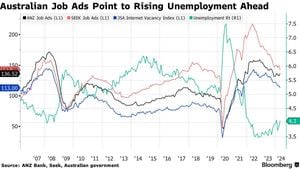Bitcoin's remarkable rise has been one of the standout stories of the financial world lately, and its latest surge to record highs has electrified traders and investors alike. On November 13, 2024, Bitcoin soared past the $93,400 mark, setting a new benchmark for the cryptocurrency.
While Bitcoin basked in the glow of its achievement, global equity markets took on a more subdued tone, largely digesting conflicting economic signals. Traders were particularly attentive to the United States' latest inflation figures, which indicated a minor uptick. This duality—a booming cryptocurrency market against the backdrop of stable yet concerning inflation—has left many analysts scratching their heads.
The Consumer Price Index (CPI), which tracks the average change over time in the prices paid by consumers for goods and services, recorded inflation levels aligning closely with expectations, prompting varied reactions from Wall Street experts. "The drivers, in large part, are the fact the CPI came in very much inline with expectations, and some buzz in the markets yesterday," noted Art Hogan, Chief Market Strategist at B. Riley Wealth Management. He concluded by adding, "So coming inline was very much a positive."
Nonetheless, the faint rise in inflation has also reignited concerns among market watchers, particularly due to the potential impact of Donald Trump’s administration—should he return to the presidency—on trade and inflationary policies. Trump's plans for introducing tariffs could complicate the economic picture, which would likely lead to the Federal Reserve adopting more conservative interest rate cuts. Susannah Streeter, Head of Money and Markets at Hargreaves Lansdown, commented, "If prices are already looking unruly, expectations will rise for Trump's threats to be watered down."
The market is currently walking the line between optimism and caution, as shown by Srijan Katyal, Global Head of Strategy and Trading Services at ADSS brokerage, who pointed out, "This reading of inflation has slightly disrupted the disinflationary pattern we have seen over the last few months but continues to remain stable around the targeted level." He also suggested, with Trump's victory, concerns about inflation worries could resurface.
Despite these economic uncertainties, Bitcoin's rally remains strong, and it's difficult to overlook the influence of political dynamics. The nerve-wracking election season has, paradoxically, served as both a catalyst and impediment to market movements. Trump's pledged deregulation around digital currencies appears to have bolstered confidence among cryptocurrency investors.
The excitement surrounding cryptocurrency is palpable, especially considering its ability to thrive even during turbulent economic times. Analysts have noted, "The crypto market operates independently of traditional market pressures, which has been exemplified through Bitcoin's latest gains." Yet this surge has taken place amid broader market stagnation, as US stocks remained relatively unchanged—a picture of investor sentiment uncertain how to interpret mixed economic signals.
Meanwhile, European markets have shown little movement. On the day of Bitcoin's surge, key indices remained stable, with Frankfurt's DAX slightly down by 0.2%, and Paris's CAC 40 wobbling at down 0.1%. This climate of uncertainty is compounded by political upheaval within Europe, particularly concerning upcoming elections and the leadership dynamics shifting amid political transitions.
Asian markets followed on this note of instability; many ended lower as Trump appointed staunch critics of China to pivotal cabinet roles, bringing fresh fears of trade conflicts between the major world economies. The interplay of politics and economics has again demonstrated its complexity, as foreign markets react to shifts and surprise announcements.
Despite these tensions, the energy market exhibited positive movement on the same day. Brent North Sea Crude saw its price rise by 0.5% to $72.28 per barrel, reflecting potential gains attributed to consistency within the oil sector.
Nonetheless, the question looms: How sustainable is Bitcoin's meteoric rise? Cryptocurrency remains at the forefront of many traders' minds, particularly when considering the potential influence of upcoming economic policies from the United States and geopolitical developments. Will Bitcoin continue to defy traditional market logic, or will it be tethered by the same forces impacting global trading patterns? Only time will tell, but as it stands, the cryptocurrency's vibrant pulse and market dynamics are anything but stagnant.
While dollar movements were also notable, with fluctuations against the yen and euro, many chose to keep their focus on Bitcoin. With interest rates perhaps more stable than they'd been post-election period, investors are left pondering the future of cryptocurrency against traditional benchmarks. No matter what direction the markets swing next, Bitcoin's upward trend has captured the imagination of investors and market watchers everywhere.
Analysts agree, Bitcoin’s apparent resilience may signify a broader shift among investors, steering their portfolios toward digital assets. The technology and accessibility of cryptocurrency continue to expand, drawing even cautious investors' attention as they seek new avenues when traditional markets appear lackluster.
So here we are, balancing on this economic tightrope, with all eyes set firmly on what the next Bitcoin milestone will be, as well as the reverberations of political choices. Such is the life of market participants nowadays, where data points and political movements can simultaneously uplift and topple paradigms as they navigate the waves of inflation, regulation, and digital advancements.
For now, Bitcoin's highs have outshone the stalling global equity markets, leaving many to recognize the influence of cryptocurrency as part of the contemporary financial ecosystem. Its ability to rally amid inflation concerns may speak volumes about its growing adoption as both currency and investment vehicle. Bringing together enthusiasm, wariness, and hope, Bitcoin remains at the forefront of financial dialogue and debate.



